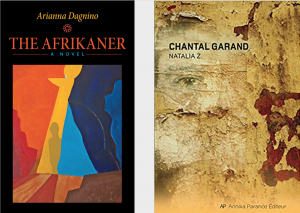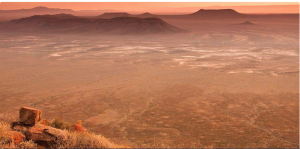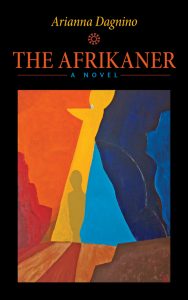It is always a special honour to receive the appreciation of a fellow writer for one’s work.
The Canadian writer C hantal Garand, author of the novel Natalia Z. (Annika Parance Editeur, Montréal, 2018), which will also appear in Norwegian translation in 2020, has agreed to let me publish the letter she sent me after having read my novel The Afrikaner.
hantal Garand, author of the novel Natalia Z. (Annika Parance Editeur, Montréal, 2018), which will also appear in Norwegian translation in 2020, has agreed to let me publish the letter she sent me after having read my novel The Afrikaner.
Two words stand out in Chantal’s comments: “discomfort” and “trust”. In my view, these two words encapsulate what writing is all about.
Chantal has written her letter in French, the language in which she creatively writes, although her English is as good. I have provided an English translation of the text (original French text follows).
Dear Arianna,
I have just finished reading “The Afrikaner” and I want to express the pleasure I had in reading your novel. The characters’ stories are captivating and skillfully express the torments and dilemmas experienced by South Africans in the post-apartheid period. I lived 4 years in South Africa, always with the impression of living in a cocoon, totally excluded from what the different layers/cultures of this troubled society are going through. I’ve never been able to penetrate people’s souls like you have.
Your novel shows admirable sensitivity and evocative power. Having so finely described the discomfort that is palpable among South Africans, I can tell you did not waste your time during your stay in this country. You have certainly succeeded in connecting with people who have trusted you enough to let you explore what they are trying to understand themselves. Congratulations, your novel is a great success and has the merit of not making easy judgments.
Chantal Garand
Chère Arianna,
Je viens de terminer la lecture de The Afrikaner et je veux vous exprimer le plaisir que j’ai eu à lire votre roman. L’histoire des personnages est captivante et est habilement intégrée aux tourments et dilemmes ressentis par les sud-aficains en période post-apartheid. J’ai vécu 4 ans en Afrique du Sud, toujours avec l’impression de vivre dans un cocon, totalement exclue de ce que vivent les différentes couches/cultures de cette population troublée. Je n’ai jamais réussi à pénétrer l’âme des gens comme vous l’avez fait.
Votre roman démontre une sensibilité et une force d’évocation admirables. Pour avoir si finement décrit l’inconfort qui est palpable chez les sud-aficains, je constate que vous n’avez pas perdu votre temps pendant votre séjour dans ce pays. Vous avez certainement réussi à vous lier avec des gens qui vous ont fait suffisamment confiance pour vous laisser explorer ce qu’ils tentent eux-même de comprendre. Bravo, votre roman est une belle réussite et a le mérite de ne pas porter de jugement facile.
Chantal Garand
Arianna Dagnino, “The Afrikaner” (Guernica Editions, Toronto, 2019): https://www.amazon.com/Afrikaner-Essential-Prose-Arianna-Dagnino/dp/1771833572
Chantal Garand, “Natalia Z.” (Annika Parance, Montréal, 2018): https://www.apediteur.com/litterature/livre/natalia-z
 “When it comes to societies like South Africa, there is always something that will contradict your preconceived notions,” says Arianna Dagnino, author of “The Afrikaner,” published by Guernica Editions (Toronto) in 2019.
“When it comes to societies like South Africa, there is always something that will contradict your preconceived notions,” says Arianna Dagnino, author of “The Afrikaner,” published by Guernica Editions (Toronto) in 2019. The novel is set in the South Africa of 1996. The book follows Zoe du Plessis, a paleontologist of Afrikaner descent, struggling with white group guilt, a dark family secret and the recent loss of a lover and colleague. The Afrikaner begins as Zoe embarks on a journey of self-discovery and atonement, while on a field expedition into the hot plains of the Kalahari Desert. She is there in search of early human fossils.
The novel is set in the South Africa of 1996. The book follows Zoe du Plessis, a paleontologist of Afrikaner descent, struggling with white group guilt, a dark family secret and the recent loss of a lover and colleague. The Afrikaner begins as Zoe embarks on a journey of self-discovery and atonement, while on a field expedition into the hot plains of the Kalahari Desert. She is there in search of early human fossils.


